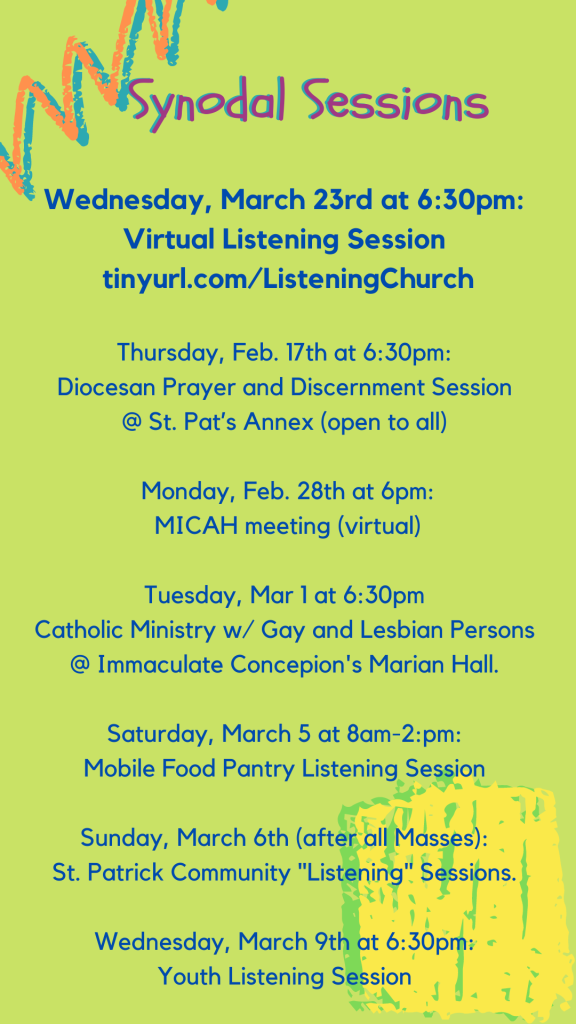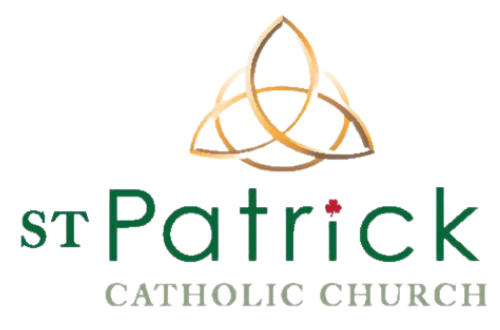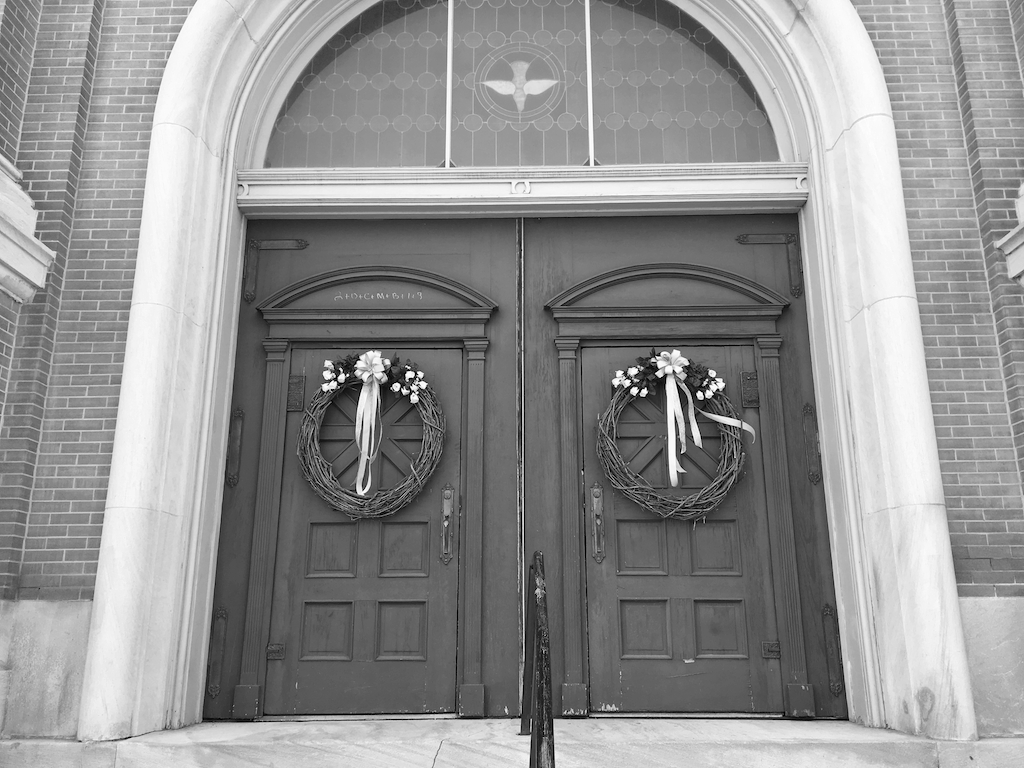Synod: Listening Church
Father Val’s Synodal Session Report:
The synodal process works! The team at St. Patrick’s made this a main priority. We enlisted other parishioners, together with us, personally to invite people to participate. There was a Sunday homily on the synodal process. We had a small team to plan our process in the parish, including a parishioner who worked with the media. He successfully got Father Val’s Sunday homily reprinted in The Daily Memphian, as well as a lengthy article in The Commercial Appeal. As a result, a rather small parish had 150 parishioners take part in synodal groups. Together with our outreach to those groups “pushed to the margins,” the total involvement was more than 250 persons.
We found that the diocese’s process for what we called “listening” sessions, including lectio divina and the questions (taken from synodal documents) really worked well. We used that outline of meetings in all of our gatherings, with adaptions made to the make-up of the group. (For example, in an ecumenical setting of MICAH, which included participants from non-Christian religions, we used Ezekiel 37 about the “dry bones” and the Spirit bringing them to life.)
Pope Francis, in his catechesis on the synodal process, strongly places it within the theological framework of Vatican Council II, particularly as given in Lumen Gentium. He also strongly call on this synodal process to become the operative framework within all decision-making in the church. He knows, of course, that this is a process on ongoing formation.
At St. Patrick’s, we shall continue to integrate this synodal process in our decision-making, as, for example, in our Parish Pastoral Council meetings.
Again, the synodal process works, and we at St. Patrick’s can attest to it! Wouldn’t it be refreshing if Bishop David gathered all the presbyterate for a full-day of prayer and reflection during one of the nine days prior to the coming Pentecost? It would be mandatory, as indicative of its importance. In that day of reflection, there would be a synodal meeting held for all the priests, using the model that the diocese has proposed (suggesting, perhaps, that the Scripture reading for lectio divina would be Pentecost-related). Wouldn’t it be then within the scope of Pope Francis’ stress on the synodal process that Bishop David would say that this process would be used for all diocesan meetings, such as the Presbyteral Council, diocesan staff meetings, etc.)?
In this process, we have these main takeaways: a welcoming and inclusive church, accessibility, priest shortage, and accompaniment with LGBTQIA+ people. The strongest priority was the call for a “welcoming,” inclusive church. This welcome and inclusivity is not just about having a warm greeting and handshake at the entrances or during the Sign of Peace. It’s not only about people knowing each other’s names and jobs, but about how we accept one another as our whole selves: good, bad, ugly, doubting, prophetic, holy, etc. Our cultural practices and individual gifts should be respected and integrated into our communities.
One participant told a story about how he was an active member of a parish for years including being a devoted lector who also took time to form and support other lectors during his time at this parish. Unfortunately, when a new pastor was installed, this priest decided to get rid of the wheelchair accessible entrances into the sanctuary from the nave rendering this particular person unable to exercise their lifelong call to proclaim God’s word. When the person went to the priest, the priest replied that nothing would be done to accommodate him or anyone else with accessibility needs. He and his wife left that community in search of another parish that was welcoming to them and their gifts. Now they travel across the city to attend Mass, a privilege afforded by their car and ability to afford gas. Something they would not be able to do if they were in a lower economic class.
It is amazing that, a month ago, Pope Francis sent to every priest in the world a letter calling for the synodal process to be implemented!
Our adolescents and teens expressed how God’s commandment to love God and our neighbors is not reflected in the teachings and doctrine of the Catholic Church— particularly when it comes to welcoming and accompanying the LGBTQIA+ community. The youth participants asked how 5 could they begin to evangelize when the reputation of the Catholic Church means such rejection of the Queer community and anyone who is “other”?
Participants—at least once in every session—brought up that we need to re-evaluate the crisis of a dwindling number of priests. To be honest, we thought this was going to come up more often. In these sessions, when it was raised, persons spoke of the possibility/need of a married clergy and of women priests.
We are very inspired by this process and, as aforementioned, will keep it as a common use praxis going forward
Click here to read the scanned notes from our sessions.

Our Holy Father Pope Francis has invited the Catholic Church to embark on a journey together. Through listening and discernment rooted in the Holy Spirit, the entire people of God will be called to contribute to a process by which the Church deepens in understanding of Her mission and looks toward the future. A Synod, which is the process by which the Church will begin this important work is not just a convening of Bishops reflecting on a particular topic and advising the Pope. A Synod is a journey of discernment, in which the people of God are called to pray and reflect upon the Holy Spirit’s will for the Church. Through our listening and our sharing, we will seek to understand what the Holy Spirit’s will is for the topic being discussed – and thus, for the Church. For the 2023 Ordinary Synod of Bishops, that topic is synodality. Simply put, synodality is discerning how the Spirit is moving through and with the Body of Christ, so that we may continue to fulfill our mission to evangelize in the world.
So what does that mean for us?
We here at St. Patrick’s believe in an “Acts” Church— one that moves by the Holy Spirit present in the people. We cannot be afraid of being humbled by our failures or inspired by what we can be as the People of God.
With that in mind, we are planning multiple listening sessions in order to reach as many people as possible to hear the challenges, hopes, and dreams concerning our world and the Catholic Church globally.

